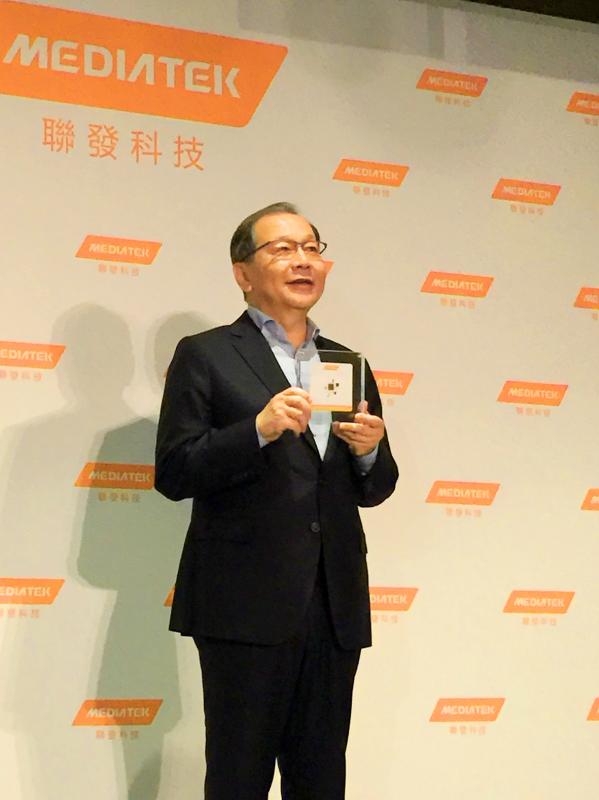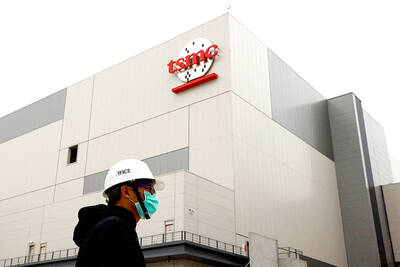Handset chip designer MediaTek Inc (聯發科) yesterday said it has submitted an application to the US government for permission to continue supplying chips to Huawei Technologies Co (華為) after Washington’s new restrictions on the Chinese telecom giant’s access to US technology take effect next month.
The US Department of Commerce early this month further tightened its grip on Huawei’s access to foreign-made chips developed or produced using US software or technology amid escalating tensions with China.
Almost all suppliers of Huawei will require a license from the department to be able to ship chips to Huawei.

Photo: Lisa Wang, Taipei Times
The new curbs are to take effect on Sept. 15 after a 90-day grace period ends.
MediaTek said it “has already applied to the US side based on regulatory rules,” according to a brief company statement yesterday.
The Hsinchu-based company said it is “waiting for a review.”
The chip supplier reiterated that it would comply with relevant laws and rules on global trade, the statement said.
MediaTek was originally considered a major beneficiary of the export ban on US technology, as Huawei has been increasingly adopting chips designed by MediaTek as substitutes for those designed by its semiconductor arm, HiSilicon Technologies Co (海思), to circumvent the US restrictions.
However, the new US curbs have upended the scheme.
Last week, MediaTek said in a regulatory filing that the US’ latest rules “should not have a significant impact on the company’s operation in the short term.”
Taiwan Semiconductor Manufacturing Co (TSMC, 台積電) has said that it has since May 15 stopped taking new orders from Huawei, its second-biggest customer.
TSMC has no plans to ship wafers to Huawei after Sept. 14. TSMC makes chips designed by HiSilicon.
Separately, the Ministry of Economic Affairs (MOEA) yesterday said that it has revised related rules to further prevent the outflow to China of technology developed by local firms.
Local companies, individuals and organizations would require the ministry’s approval to provide or transfer technologies or patents to Chinese entities, the ministry said.
At present, only technology licensing deals need the ministry’s approval.
“The ministry is tightening regulations to guard against China’s access to Taiwan’s crucial technologies,” Investment Commission spokesman Su Chi-yen (蘇琪彥) said on the telephone.
The new rules would also include the licensing or transfer of patents relating to layout designs of integrated circuits.
The new rules are to take effect by the end of this year at the earliest, Su said.

Stephen Garrett, a 27-year-old graduate student, always thought he would study in China, but first the country’s restrictive COVID-19 policies made it nearly impossible and now he has other concerns. The cost is one deterrent, but Garrett is more worried about restrictions on academic freedom and the personal risk of being stranded in China. He is not alone. Only about 700 American students are studying at Chinese universities, down from a peak of nearly 25,000 a decade ago, while there are nearly 300,000 Chinese students at US schools. Some young Americans are discouraged from investing their time in China by what they see

Taiwan Semiconductor Manufacturing Co (TSMC, 台積電), the world’s largest contract chipmaker, yesterday reported record sales for the first quarter, which analysts attributed to solid demand for emerging technologies. Consolidated revenue totaled NT$592.64 billion (US$18.51 billion) in the January-to-March period, up 16.5 percent from a year earlier, but down 5.26 percent from the previous quarter, TSMC said in a statement. The first-quarter revenue beat analysts’ average projection of NT$579.5 billion, Bloomberg News reported. That performance lends weight to expectations that the world’s most valuable chipmaker would return to solid growth this year after weathering a post-COVID-19-pandemic cratering of smartphone and computer sales. TSMC is budgeting

MAJOR DROP: CEO Tim Cook, who is visiting Hanoi, pledged the firm was committed to Vietnam after its smartphone shipments declined 9.6% annually in the first quarter Apple Inc yesterday said it would increase spending on suppliers in Vietnam, a key production hub, as CEO Tim Cook arrived in the country for a two-day visit. The iPhone maker announced the news in a statement on its Web site, but gave no details of how much it would spend or where the money would go. Cook is expected to meet programmers, content creators and students during his visit, online newspaper VnExpress reported. The visit comes as US President Joe Biden’s administration seeks to ramp up Vietnam’s role in the global tech supply chain to reduce the US’ dependence on China. Images on

US CONSCULTANT: The US Department of Commerce’s Ursula Burns is a rarely seen US government consultant to be put forward to sit on the board, nominated as an independent director Taiwan Semiconductor Manufacturing Co (TSMC, 台積電), the world’s largest contract chipmaker, yesterday nominated 10 candidates for its new board of directors, including Ursula Burns from the US Department of Commerce. It is rare that TSMC has nominated a US government consultant to sit on its board. Burns was nominated as one of seven independent directors. She is vice chair of the department’s Advisory Council on Supply Chain Competitiveness. Burns is to stand for election at TSMC’s annual shareholders’ meeting on June 4 along with the rest of the candidates. TSMC chairman Mark Liu (劉德音) was not on the list after in December last